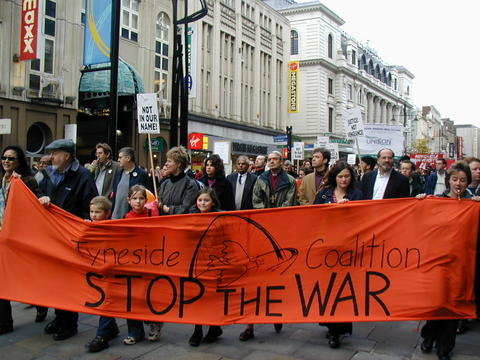
A
successful anti-war march and rally was organised in Newcastle by the
Tyneside Stop The War Coalition on Saturday, November 3. Over 600
people marched through Newcastle upon Tyne, calling for an end to the
bombing of Afghanistan. The crowd heard eight speakers from a diversity
of groups, united in their condemnation of the terrorist attacks of
September 11, and their call for the violent retaliation against
Afghanistan to end.
The march moved off from the Civic Centre behind a
large banner Tyneside Coalition - Stop the War, on its way to
the Grey's Monument in the centre of Newcastle. Hundreds of placards
with the slogans, Not
In Our Name!, Peace and Justice for All!, No More Victims!, Give Peace
a Chance! Health Workers Against the War! Millions Will Starve This
Winter! were held up by the demonstrators as it passed down
Northumberland Street accompanied by the sound of the drums of a Samba
Band at the head of the march. Hundreds of leaflets were given out
along the way and many people joined in swelling the demonstration to
around a thousand by the time it reached the Monument.
The
speeches at Grey's Monument began with a powerful plea by Rabbi Moshe
Yehudai-Rimmer for the bombing to stop and innocent victims to be
spared, ending with a prayer in English and Hebrew. He was followed by
Alan Smithson (Bishop of Jarrow), Kevin Flynn (Tyneside Socialist
Alliance), Rasheed Saraba (Pakistan Labour Party) and Sylvia Boyes (CND
and Trident Ploughshares), as well as Farrah Kahn and Russell Gasser.
Tina Downes, national President of the NATFHE lecturers' union, spoke
of the need for a rational response, looking for the causes of the
terror attacks and not for violent retaliation, and messages of support
were read from MPs and the Deputy Mayor, John Marshall. Alice Mahon,
MP, sent a statement calling for the bombing to stop to allow in food
aid, saying "The war is producing more innocent victims, and is not a
just response."
Several of the speakers condemned the horrific
use of cluster bombs during the last week. Farrah Kahn, a freelance
journalist, compared them to air-borne landmines, describing how she
had met toddlers maimed by the unexploded yellow bomblets. Russell
Gasser, who worked two years ago with landmine clearance groups in
Afghanistan, spoke of "cluster bombs" and "carpet bombs" as two of the
worst phrases in the English language, describing their hugely
indiscriminate nature (a large proportion, or even all, of the bombs
dropped, from 5-6 miles up, will miss their target), and their high
failure rate (10-30% of the bomblets fail to explode). Every field in
Laos is now unsafe for local farmers, because of unexploded munitions
left behind after "carpet bombing" by US planes during the Vietnam war.
Concluding the rally Sam Robson, who chaired the
proceedings on behalf of the Tyneside Stop the War Coalition,
said that the demonstration and rally had been a magnificent
achievement and had put down a marker in the north east that we will
not tolerate this war being carried out in our name. He said that the
Stop the War Coalition condemned the innocent deaths in New York and
equally condemned the deaths of innocent people in Afghanistan. "We are
part of an international movement against the war, and the movement is
growing." he concluded.
"The march was bigger than we had even
hoped, and its diversity demonstrated the breadth and depth of feeling
against the war," said Andrew Gray, from the local coalition group that
had organised the protest. "The response of the US and UK this last
week has been to escalate the violence and resort to carpet bombing.
The military response is not just politically foolish but profoundly
wicked."
The coalition later held its seventh weekly vigil for
peace, and has organised two coaches for the national demonstration in
London on November 18.
Source:
Workers' Daily
Internet Edtion




